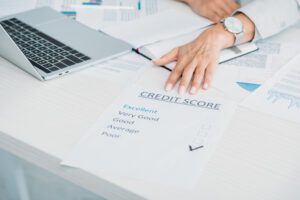By Maddy Scheckel
March 9, 2023

Some of the links in this post are from our sponsors, and we might earn a commission if you click on one.
You might be wondering, “What is a personal loan?” In short, it’s when you borrow money from a lender like a bank or credit union.
Here’s my story with personal loans:
A few years ago, my bank offered me a credit card at 25% interest, and I maxed it out because it’s free money, right?
Wrong! I learned this the hard way.
It left me with over $5,000 of debt!
Luckily, a friend suggested taking out a personal loan to consolidate my high-interest debt, and this changed my life!
So, if you want to use personal loans to your advantage, read on.
How Do Personal Loans Work?
Now that we’ve established “what is a personal loan,” let’s learn how it works.
When you apply for a personal loan, lenders will determine how likely you are to pay back the loan amount by analyzing factors like:
- Credit score and history
- Monthly income
- Debt-to-income (DTI) ratio
Banks will lend you money if they think you’re a responsible consumer. The original amount of the loan is called the Principal.
Lenders also charge a fee for lending money, which is known as interest. You’ll have to pay the principal plus interest back over a set timeframe.
When to Use Personal Loans
The most common uses for personal loans include:
- Debt consolidation
- Education
- Medical or financial emergencies
I’m a big fan of personal loans because they helped me get rid of my high-interest credit card debt.
Most credit cards have interest rates over 20%.
So by using a personal loan with a more reasonable interest rate of, say, 10%, you can pay off your credit card debt much faster and save loads of money.
Student loans are another type of personal loan. Students will borrow money for college expenses. Once they graduate, they’ll start paying off this debt in monthly installments.
When the pandemic hit, consumers also started borrowing to pay for emergencies like:
- Hospital bills
- Car and home expenses
Be aware that some lenders have restrictions on what the loan can be used for. For instance, not all lenders will let you borrow money for college expenses.
How Personal Loans Affect Your Credit Score
To understand how personal loans affect your credit score, you must first know how credit bureaus calculate credit scores.
Credit scores are based on five factors. These include payment history, amounts owed, length of credit history, new credit, and credit mix.
When calculating your score, credit bureaus use the following formula:
- 35% of your score is based on payment history
- 30% of your score is based on your outstanding balances
- 15% of your score is based on your credit history
- 10% of your score is based on new debt
- 10% of your score is based on the number of credit lines you have
Taking out a personal loan can temporarily lower your score. But, if you make the minimum monthly payments, it’ll eventually build your credit score. This helps you qualify for larger loans like mortgages or vehicle financing.
What Can I Use a Personal Loan For?
Here are some expenses you can put a personal loan towards:
- Debt consolidation
- Medical bills
- Emergencies
- Large purchases
- Tax debt
Types of Personal Loans
Let’s get a better understanding of each loan type.
Debt Consolidation
Debt consolidation might sound like a sketchy life hack that reduces your credit card debt overnight, but it’s 100% legal and even encouraged.
Debt consolidation is when you take out a lower-interest loan to pay off higher-interest debt. This decreases your interest rate immediately.
Some people even combine several debt balances into one loan. This helps by streamlining your debt. You’ll only have one monthly payment and one interest rate to worry about.
So if you have large amounts of credit card debt, consider taking out a personal loan.
Medical Bills
Personal loans can be used to pay for emergency medical bills. This is especially helpful for those that don’t have health insurance.
Depending on your credit score and relationship with your bank, lenders may offer a no-interest agreement option if you pay your loan off before a specific date.
Emergencies
If you’re facing a personal emergency, maybe you lost your job, or there’s a death in the family, you can take out a personal loan to settle the unexpected bills.
Large Purchases
Another popular reason why consumers use personal loans is to make large purchases. Examples of this could be:
- Homes
- Cars
- Household appliances
- Home improvements
- Boats and other recreational vehicles
So if you’re looking to buy a car or make home improvements, consider taking out a low-interest personal loan. You can buy your new toys and pay them off in monthly installments.
Tax Debt
If you owe the government a hefty amount in taxes, try taking out a personal loan. This is a good idea because it could save you from paying interest on the tax debt.
If you’re able to get a personal loan at a lower interest rate than the IRS is offering, you’ll save money.
How Do I Get a Personal Loan?
Does the loan application process make you sweat? Don’t stress.
Getting a loan is easier than you think. Follow this five-step process, and you’ll finish the loan application process in no time.
Applying for a Personal Loan
- Choose your loan type: There are various types of personal loans. It’s essential to pick the one that meets your needs if you want the lowest interest rate and best payment plan. You can find specialized loans for debt consolidation, vehicle financing, and home loans.
- Compare lenders: When I was new to personal loans, I accepted the first bank willing to give me money. Don’t make the same mistake I did. Instead, shop around and compare interest rates and fees. In the end, you’ll be glad you took the time to find the cheapest loan.
- Pre-qualify: After picking a loan with low rates, complete the pre-qualification process. This gives you an idea of what you’ll qualify for. Depending on your situation, repayment plans, interest rates, and fees can vary.
Most online lenders will only conduct “soft checks,” which won’t hurt your credit score. This comes in handy if you’re applying for several loans at once.
- Get a cosigner or offer collateral: This step is optional. But it increases your chances of qualifying, especially if you have a bad credit score.
By getting a cosigner, you add someone else’s income and credit score to your application. They will also be responsible for this loan, so it’s less risky for the bank to make their money back.
Collateral is also helpful as the bank can use it as a payment alternative if you don’t follow through.
- Apply for a loan: The last step is to gather paperwork. Loan applications typically ask for documents like proof of income, bank statements, and proof of residence.
Once the lender accepts your application, the hardest part is over! Feel free to make home improvements or pay off that wallet-draining debt.
Alternatives to Personal Loans
Luckily, personal loans aren’t the only option when you need money fast. Here are some alternatives that worked well for me:
- 401K loans
- Salary advances
- Balance transfer credit cards
401K Loans
If you’ve applied for personal loans at multiple financial institutions and can’t qualify, try a 401K loan.
You won’t have to submit documents or meet minimum credit score requirements. This makes it perfect for consumers who are ineligible for personal loans but require immediate cash for an emergency.
The best part is you can complete the entire application online.
However, there are some drawbacks.
You’ll be taxed twice on the money you owe while losing any earnings you would have made by keeping the money in your 401K account.
For this reason, I’d suggest only using 401K loans as a last resort.
Salary Advances
If you don’t want to borrow against your 401K, another option is to ask your employer for a salary advance. This is when you borrow money on a future paycheck.
In other words, you get your paycheck earlier than you normally would. This isn’t as serious as a 401K loan and has fewer consequences.
Not all employers will offer salary advances. Instead, you could download a paycheck advance app.
This is essentially the same thing as a salary advance, except the early paycheck cash is coming from a third party. You would then pay the third party your paycheck once it’s in hand.
Balance Transfer Credit Cards
With a balance transfer credit card, you can transfer all your debt into one account at a 0% interest rate. Most balance transfer credit cards only have this type of offer for a limited time, such as the first 12 to 24 months.
This gives you time to pay off any high-interest debt. It’s a good option for anyone looking to consolidate debt that doesn’t qualify for a loan.
Commonly Asked Questions About What is a Personal Loan
Commonly Asked Questions About What is a Personal Loan
A personal loan is when you borrow money from a lender and sign a contract to pay it back within a specific timeframe. Your bank will charge a fee for lending you money, which is called interest. You (the borrower) will be expected to pay back the principal (original loan amount) plus interest.
What’s Considered a Personal Loan?
Home loans, student loans, emergency loans, vehicle financing, and debt consolidation are all considered types of personal loans.
What is a Personal Loan Used For?
You can use personal loans to consolidate debt, pay emergency expenses, or make large purchases like homes and cars.
What is the Difference Between a Loan and a Personal Loan?
A loan is an umbrella term for various types of loans like small business loans, personal loans, credit-builder loans, and payday loans. But a personal loan is a specific type of unsecured loan that consumers can access if they meet minimum credit, debt-to-income (DTI) ratio, and income requirements.
Is it a Good Idea to Get a Personal Loan?
A personal loan is a good idea if you’re using it to pay for emergency expenses or to consolidate debt. However, if you’re taking out personal loans to buy unnecessary things, then it’s an easy way to end up with mountains of debt.
How Can I Get Approved For a Personal Loan?
You can get approved for a personal loan by having a steady income, a good credit score, and a low debt-to-income (DTI) ratio. If your credit score is not good, consider offering collateral or finding a cosigner to apply with. Check out this article on how to get a personal loan.
How Does a Personal Loan Work?
The way personal loans work is simple. You borrow money from a lender at a fixed interest rate and pay it back in monthly installments over a specified timeframe. For more information, read this article on how to get a personal loan.
What is a Personal Loan Interest Rate?
A personal loan interest rate is the fee lenders charge to let you borrow money. This is typically a percentage. Interest rates vary based on how likely you are to pay the loan back.
How to Get a Personal Loan
Getting a personal loan is simple. Check out this article on how to get a personal loan. Don’t forget to do your research and crunch the numbers to find the deal with the lowest interest rates and annual fees.




